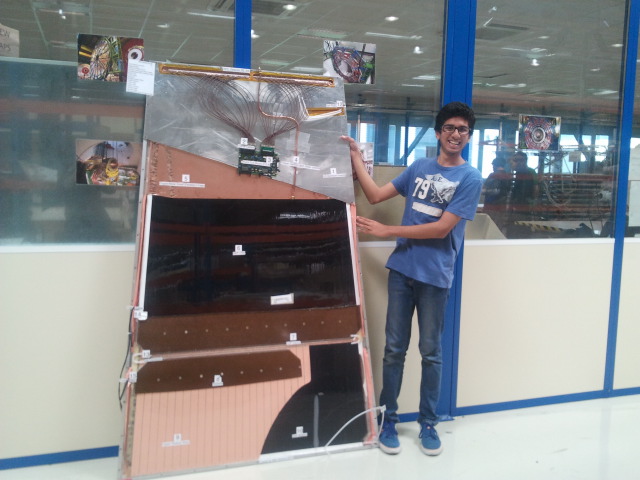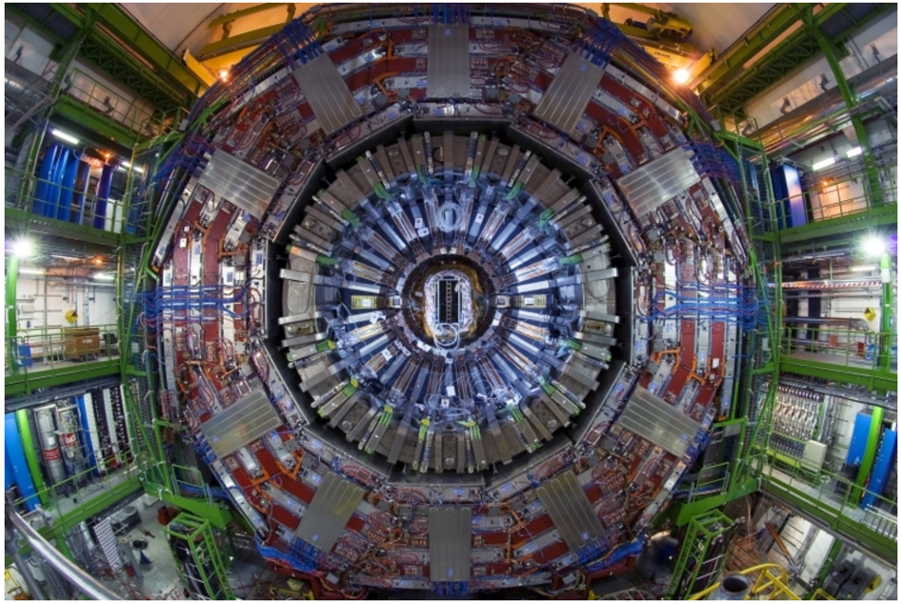
Mihir Khanna, from the Dhirubhai Ambani International School in Mumbai, India, was one of hundreds of high-school interns who come to CERN each year. He recounts his once-in-a-lifetime experience below.
Near the foothills of the Alps, a short distance from Lake Geneva lies CERN, home to the LHC (Large Hadron Collider) and much more. It is here that I got the opportunity to intern for three unforgettable weeks. Having several sites spread across two countries and filled with the world’s best and brightest minds, crossing international borders multiple times a day is considered completely normal at CERN. Just as coming to work in a pair of shorts and a T-shirt is normal and coming to work on your first day dressed in a suit makes you stand out. CERN thrives on its casual culture, thereby allowing its senior most researchers to mingle with PhD students and the occasional high-school intern, like me. Lunch hour is always interesting, with scientists of varying seniorities and nationalities dining together and discussing everything from the intricacies of particle physics, to why bubbles in Guinness go down instead of up, to whether Italian vegetables are superior to Swiss vegetables.
CERN is always a hive of activity with thousands of scientists and hundreds of students hard at work in the various labs and offices spread across the sites, be it trying to design the next generation of detectors for the LHC or solve some of the unanswered theoretical questions that the Universe presents.
It was in this dynamic environment that I interned under the expert guidance of Dr. Archana Sharma, a senior particle physicist directly involved with CMS (Compact Muon Solenoid), one of the giant detectors at the LHC which was responsible for discovering the Higgs boson last year. My internship coinciding with the first long shutdown of the LHC gave me a rare opportunity to go down to the CMS and the ALICE (A Large Ion Collider Experiment) caverns 100 meters underground, and see them open and under maintenance. I got the opportunity to attend lectures given by some of the most respected people in their fields and attend coffee seminars, a unique platform where researchers share their recent findings and ideas with their colleagues.
For a large part of my internship, I worked at the RPC (Resistive Plate Chambers) lab, dedicated to the production of detector components to be installed in CMS before the LHC’s restart in 2015. I worked alongside CERN scientists and PhD students building and testing these detectors from ground up, detectors that will soon be part of CMS, studying the Higgs boson and searching for other new particles. It is an inexplicable feeling knowing that something you contributed to will play a small, yet integral role in some of the most ground-breaking research going on at the world’s most renowned research centre, CERN.
During my internship at CERN, Dr. Sharma also put me up to the challenge of creating a scientific model of an RPC, using all the actual components, to depict each and every layer of the detector for a CMS exhibit. This task presented a unique challenge; not only did it involve cutting through solid metal, but it also demanded an accurate understanding of the workings of an RPC detector. After a week’s work in the lab, I succeeded in building an entire detector chamber depicting all components of an RPC to allow the general public to understand how an RPC functions.
Additionally, I visited the lab of the CSC (Cathode Strip Chambers), another type of detector installed in CMS, as well as the GEM (Gas Electron Multiplier) lab, where researchers are currently developing the next generation of detectors to be installed in CMS during its next long shutdown. CERN also boasts multiple exhibits open to the public describing the Universe as well as the history of CERN and its various experiments, which I was able to explore in great detail.
Physics has been my passion from a very young age, and working at CERN has been a lifelong dream. Over the years, I had been warned that maybe I was building CERN up in my mind to be more than it really is. However, based on my exposure over the last three weeks, I can say with absolute certainty that CERN has definitely lived up to what I expected and much more. I have learnt and experienced more in these three weeks than anyone possibly could during even a year behind a school or university desk. As an aspiring physicist, I am truly grateful for this experience and shall always cherish it.
- Log in to post comments

